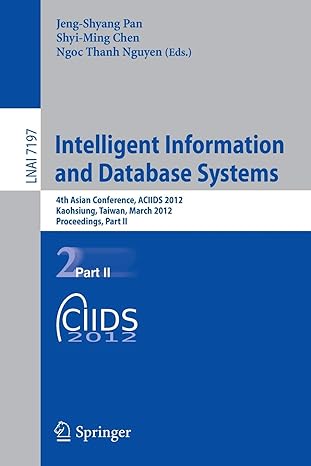Question
1. Implement the code. Note that the code on Figure 4.13.1 has some errors that you need to fix. 2. The code only supports the
1. Implement the code. Note that the code on Figure 4.13.1 has some errors that you need to fix.
2. The code only supports the addition instructions. Add the code to support the subtraction instructions.
3. Write a test-bench to test the CPU module. The instruction sequence that you test should consist of add, sub, load and store instructions.
module CPU (clock); // Instruction opcodes parameter
LW = 6b100011, SW = 6b101011, BEQ = 6b000100, no-op = 32b00000_100000, ALUop = 6b0; input clock; reg[31:0] PC, Regs[0:31], IMemory[0:1023], DMemory[0:1023], // separate memories IFIDIR, IDEXA, IDEXB, IDEXIR, EXMEMIR, EXMEMB, // pipeline registers EXMEMALUOut, MEMWBValue, MEMWBIR; // pipeline registers wire [4:0] IDEXrs, IDEXrt, EXMEMrd, MEMWBrd, MEMWBrt; // Access register fields wire [5:0] EXMEMop, MEMWBop, IDEXop; // Access opcodes wire [31:0] Ain, Bin; // the ALU inputs // These assignments define fields from the pipeline registers assign IDEXrs = IDEXIR[25:21]; // rs field assign IDEXrt = IDEXIR[20:16]; // rt field assign EXMEMrd = EXMEMIR[15:11]; // rd field assign MEMWBrd = MEMWBIR[15:11]; //rd field assign MEMWBrt = MEMWBIR[20:16]; //rt field--used for loads assign EXMEMop = EXMEMIR[31:26]; // the opcode assign MEMWBop = MEMWBIR[31:26]; // the opcode assign IDEXop = IDEXIR[31:26]; // the opcode // Inputs to the ALU come directly from the ID/EX pipeline registers assign Ain = IDEXA; assign Bin = IDEXB; reg [5:0] i; //used to initialize registers initial begin PC = 0; IFIDIR = no-op; IDEXIR = no-op; EXMEMIR = no-op; MEMWBIR = no-op; // put no-ops in pipeline registers for (i=0;i<=31;i=i+1) Regs[i] = i; //initialize registers--just so they arent cares end always @ (posedge clock) begin // Remember that ALL these actions happen every pipe stage and with the use of <= they happen in parallel! // first instruction in the pipeline is being fetched IFIDIR <= IMemory[PC>>2]; PC <= PC + 4; end // Fetch & increment PC // second instruction in pipeline is fetching registers IDEXA <= Regs[IFIDIR[25:21]]; IDEXB <= Regs[IFIDIR[20:16]]; // get two registers IDEXIR <= IFIDIR; //pass along IR--can happen anywhere, since this affects next stage only! // third instruction is doing address calculation or ALU operation if ((IDEXop==LW) |(IDEXop==SW)) // address calculation EXMEMALUOut <= IDEXA +{{16{IDEXIR[15]}}, IDEXIR[15:0]}; else if (IDEXop==ALUop) case (IDEXIR[5:0]) //case for the various R-type instructions 32: EXMEMALUOut <= Ain + Bin; //add operation default: ; //other R-type operations: subtract, SLT, etc.
endcase
EXMEMIR <= IDEXIR; EXMEMB <= IDEXB; //pass along the IR & B register //Mem stage of pipeline if (EXMEMop==ALUop) MEMWBValue <= EXMEMALUOut; //pass along ALU result else if (EXMEMop == LW) MEMWBValue <= DMemory[EXMEMALUOut>>2]; else if (EXMEMop == SW) DMemory[EXMEMALUOut>>2] <=EXMEMB; //store MEMWBIR <= EXMEMIR; //pass along IR // the WB stage if ((MEMWBop==ALUop) & (MEMWBrd != 0)) // update registers if ALU operation and destination not 0 Regs[MEMWBrd] <= MEMWBValue; // ALU operation else if ((EXMEMop == LW)& (MEMWBrt != 0)) // Update registers if load and destination not 0 Regs[MEMWBrt] <= MEMWBValue; end endmodule
Step by Step Solution
There are 3 Steps involved in it
Step: 1

Get Instant Access to Expert-Tailored Solutions
See step-by-step solutions with expert insights and AI powered tools for academic success
Step: 2

Step: 3

Ace Your Homework with AI
Get the answers you need in no time with our AI-driven, step-by-step assistance
Get Started


